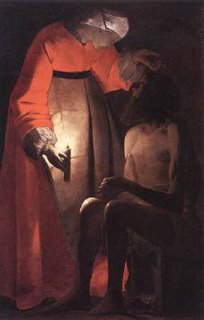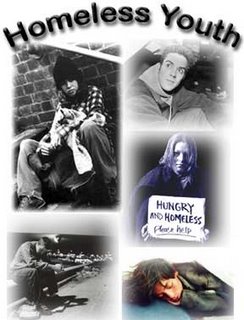Sunday 10/29/06 - Year B - Ordinary 30
Psalm 126
Hebrews 7:23-28
Mark 10:46-52
Collect (BCP)
Almighty and everlasting God, give unto us the increase of faith, hope, and charity; and, that we may obtain that which thou dost promise, make us to love that which thou dost command; through Jesus Christ our Lord, who liveth and reigneth with thee and the Holy Spirit, one God, for ever and ever.
Jericho can lay claim to being both the lowest and the oldest city on earth. Jericho lies in the Jordan Valley, ten miles from where the Jordan River flows into the Dead Sea. It is about 850 feet below sea level, compared to Death Valley which is 280 feet below sea level.

Jericho was built at the site of a powerful spring that continues to flow to this day and is the principal source of water in the area.
It is a very ancient world in which we live. And Jericho is the most ancient city known to us today. At Jericho, archaeologists have uncovered the ruins of a 30 foot tower and city walls that date to 8,000 years before Chrisit. This is 10,000 years before our time and 7,000 years before the conquest of Joshua. At the time of Jesus, the tower had long been burried in a pile of rubble.
Jericho lays along one of the most commonly used routes for travel between Galilee and Jerusalem. The road from Jericho to Jerusalem goes by a palace that Herod the Great had built to enjoy Jericho’s warm winter wieather. Jerusalem, only fifteen miles away, is 2,500 feet above sea level, or 3,350 feet above Jericho, and is cold and damp in the winter.
Jesus is on the way to Jerusalem, He knows he is on the road to Perdition, complete and utter destruction. Mark tells us nothing about Jesus’ travel in Jericho – He says “They came to Jericho,” and in the very next sentence he says, “As he was leaving Jericho...”
What was important to Mark, and important in his quest for answering the question “Who is this man, Jesus,” was the encounter he had with Bartemaus, the son of Timaeus, who used to sit at the gate of Jericho that faced Jerusalem and beg for alms because he was blind.
Why do we have a name for the blind man and a father’s name?
Bartimaeus and his father, Timaeus were known to the Community to which Mark was writing.
Bartimaeus Cried out to Jesus for mercy. Others told him to be quiet. Jesus “Opened his eyes.” Jesus gave him Light.
When we come to Jesus He gives us Light, In-Sight for our lives.
To better understand this story, let us put it in the context of the other stories Mark has been telling us along the way. Mark begins this section of his story with the healing of a blind man back in Chapter 8:22.
The rich young man.
He had kept all the laws from his youth. He had many possessions. Under the Law, he was seen as being blessed by God. He could not part with his possessions to follow Jesus.
The blind beggar
He had nothing, not even his sight. Under the Law, he was seen as a sinner and not blessed by God. He threw away his cloak, his only possession, to come to Jesus.
James & John
Seeking places of honor in the Kingdom, to Sit by Jesus’ side as he rules.
The blind beggar
Was sitting by the side of the road, in the gutter. Not a place of honor.
The blindness of the Disciples.
It is likely that the two miracles of healing the blind men highlight the "blindness" of the disciples that is illustrated in the incidents between the healing stories.
Do you have eyes, and fail to see?
Do you have ears, and fail to hear?
And do you not remember?
The disciples in Mark would have to answer, "Yes," to those questions.
One theme that our text picks up from previous discipleship sections is the "way".
At the beginning of the section, we are told that Jesus and his disciples are on the way when Jesus asks, "Who do people say that I am?"
It is on the way that the disciples argue about who was the greatest. Jesus is back on the way when the rich man runs up to him. Because of his riches he goes away. He does not follow Jesus. They are back on the way going up to Jerusalem, when Jesus tells the twelve what will happen to him...
"See, we are going up to Jerusalem, and…
[ I ] will be handed over to the chief priests and the scribes,
and they will condemn [ Me ] to death;
then they will hand[ Me ] over to the Gentiles;
they will mock [ Me ],
and spit upon [ Me ],
and flog [ Me ],
and kill [ Me ];
…and after three days [ I ] will rise again."
When they came to Jericho, Bartimaeus is sitting by the way. He is not yet "on the way," but by the side of the "way". He is an outsider. Jesus said to him, "Go; your faith has made you well." Immediately he regained his sight and followed him on the way.
In this section we have the example of disciples not fully understanding -- or seeing the way of Jesus, but the healed/saved blind man does.
Another theme is "to save," "to heal". This word occurs four times in this section. Those who want to save their life will lose it. Those who lose their life for my sake, and for the sake of the gospel, will save it. The disciples were greatly astounded and said to one another, "Then who can be saved?" (10:25)
Jesus said to Bartemaeus, "Go; your faith has made you well." Immediately he regained his sight and followed him on the way.
Our text is an example of "who can be saved" and how one is saved.
With humans – whether a rich man entering the kingdom of God or a blind man seeing again – it is impossible. With God, all things are possible.
What is the "faith" that saved/healed the blind man? Previously, this word has always been related to miracles. Jesus sees the faith of the friends and forgives/heals the paralytic (2:5) During the storm at sea, Jesus sees the fear of the disciples and asks: "have you still no faith?" (4:40) To the woman with the flow of blood who touched Jesus, he says: "Daughter, your faith has made you well [or saved you]; go in peace, and be healed of your disease." (5:34) The opposite of faith in the second occurrence is fear. A characteristic of faith in the other two verses and in our text is the fearlessness of those having faith; fearlessly tearing open a hole in the roof; fearlessly the unclean woman touches Jesus' clothing; fearlessly (and loudly) the blind man shouts to Jesus: "Have mercy on me!" Related to this fearlessness is the expectation that Jesus could and would do something.
People of faith won't let buildings, social & religious customs, or crowds keep them from pursuing Jesus' mercy.
The verb "to believe, to have faith, to trust" is used three times in the discipleship section -- all in chapter 9. Jesus tells the father of the demon-possessed boy: "All things can be done for the one who believes." The father cries out: "I believe; help my unbelief!"
Finally, Jesus says:
"If any of you put a stumbling block before one of these little ones who believe in me, it would be better for you if a great millstone were hung around your neck and you were thrown into the sea".
Believing is the expectation that God can do the impossible.
And it may be easier for the "little ones" to believe than for us "big ones".
Thanks be to God!
Deliver Us
Lord Jesus,
you give strength and joy and light
to those who want to follow you.
Make the lame jump for joy,
restore the sight of the blind,
set all the captives free
and bring to all who suffer
the hope and peace of your kingdom
where you live for ever and ever.
For the Kingdom, the power,
and the glory are yours,
both now and forevermore.
Amen.
Closing Prayer and Blessing
Numbers 6:22-26
And the LORD spoke unto Moses, saying,
Speak unto Aaron and unto his sons, saying,
In this manner you shall bless the children of Israel,
saying unto them...
The LORD bless thee, and keep thee:
The LORD make his face shine upon thee,
and be gracious unto thee:
The LORD lift up his countenance upon thee,
and give thee peace.




